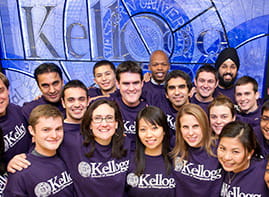A ‘surreal’ ride
Kellogg student Divya Narendra talks about his portrayal in ‘The Social Network,’ his current Internet venture and why he came to Northwestern to pursue a joint law and business degree
By Amy Trang10/22/2010 -
When Kellogg JD-MBA student Divya Narendra conceived the idea for social network ConnectU with his Harvard roommates seven years ago, he had no clue it would lead to a lawsuit, a hit movie and the “surreal” experience of watching himself being played on the big screen.
Narendra and his Harvard classmates made headlines in 2004 when they sued Facebook founder Mark Zuckerberg, whom they accused of stealing their idea for the social networking site. A fictionalized account of the events leading up to the lawsuit and thereafter is portrayed in the film “The Social Network,” with actor Max Minghella playing Narendra.
Narendra talks about the publicity, entrepreneurship and moving on.
 |
| “The opportunity to learn the fundamentals of law and business from two top-tier schools in three years was ideal given my experiences and goal to become a serial entrepreneur,” JD-MBA student Divya Narendra says. |
Q: What was it like to see yourself on the big screen in the “The Social Network?”
Divya Narendra: It’s been completely surreal. I saw the movie for the first time a few weeks ago. I was very nervous because I wasn’t sure how my personality would be portrayed and every time I showed up on screen, I was a little jittery: What was the film Divya going to say next? I’m portrayed as being a bit of a tough guy, and a lot of that has to do with the situation that we were in. The (filmmakers) wanted to create a feeling of action and urgency, which my character and my partners’ characters created.
Q: What have you learned from the ConnectU/Facebook litigation experience?
DN: Among other things, I learned the importance of building a team and formalizing certain business processes. I learned to trust my instincts, but also how the law can in many circumstances inform business decisions. After going through six years of litigation, I became more sensitive to issues surrounding intellectual property, contract law and how civil procedure actually works in our courts. My exposure to litigation is a big reason why I decided to come to Northwestern. The opportunity to learn the fundamentals of law and business from two top-tier schools in three years was ideal given my experiences and goal to become a serial entrepreneur.
Q: Talk about SumZero, the company you co-founded in 2008.
DN: When I was working at a Boston hedge fund, I realized that there was no online platform for hedge fund, mutual fund and private equity analysts to share their investment ideas. SumZero creates a universal and virtually encyclopedic database of buy-side research where thousands of analysts are contributing proprietary information. SumZero marries the concepts of Wikipedia along with social networking and tailors these concepts to professional investors.
Q: How has attending graduate school benefited you so far?
DN: There is such a diverse group of talent around you. In an academic environment, it’s very easy to be in the flow of ideas because you are surrounded by people and all of them are ambitious — they all want to do interesting things. As an entrepreneur, it’s very important to be in that idea flow.
It behooves business schools to encourage their students to take risks because that leads to innovation and new and exciting companies. If you start a company in business school and you don’t succeed, it’s not the end of the world. You’ve still learned a lot and you are still going to get a degree from Kellogg, one of the top business schools in the world, and that’s going to carry you.
Moreover, the networking opportunities are fantastic. In addition to meeting many talented peers, I have connected with outstanding professors at both Kellogg and the law school who have taken a personal interest in SumZero.






